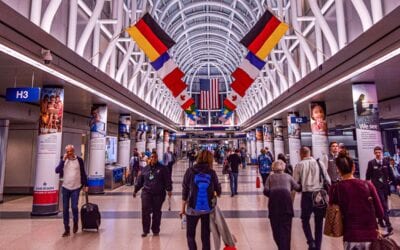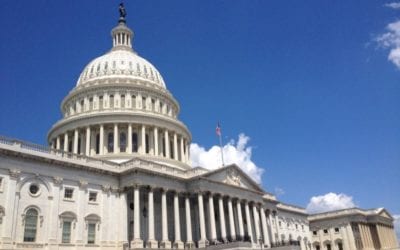Today, the government shuts down. If it were one day of shutdown, two or three, it might not make much difference. But, one day of the government closing affects months of hard work and benefits no one. For travelers, it means passengers will have a harder time learning about their rights. Citizens returning from overseas and visitor arriving in the US will wait in longer lines. Future privacy protections will be put on hold possibly for months. And, airlines will be allowed more time to obscure airfares and fees.
The losses to the American public goes far beyond what have become a juvenile schoolyard smackdown over Obamacare. Services that everyone wants, assistance, public services and programs for which Congress has voted overwhelmingly are all put on hold. The ripple effects from wasted time and wasted money to lost opportunities and recreating events and meetings are enormous and amazingly costly. Why? To what purpose? I am at a loss to understand.

One of the first casualties of this shutdown is the upcoming October 8th meeting of the Advisory Committee on Aviation Consumer Protections (ACACP). Its agenda was set. Speakers had been invited. The auditorium had been booked. Video interview technology had been tested to include speakers from the European Union. Precious resources of consumer groups had been invested. Countless emails had crisscrossed the Web with planning. Long-term plans are foiled.
Consumers, airline passengers and yes, voters, are the losers. Here are the discussions that are being set aside because of this government shutdown. Here is the email committee members received late yesterday.
With the Federal Government shutdown at 11:59 pm today becoming ever more likely, it is necessary to plan ahead regarding the Oct. 8 meeting. Since we are unable to arrange for committee member travel for a meeting until government funding is in place and since we will be unable to contact anyone about the meeting after tomorrow morning until funding is in place, we plan to cancel the meeting by close of business today (11:59 pm) unless the situation changes. We will post a notice of the cancellation on our website by COB today, place a copy of the notice in the advisory committee docket by COB today or tomorrow morning, email the notice to persons on the office’s general email lists by COB today or tomorrow morning and ask our contractor to notify registered attendees of the cancellation by email by tomorrow morning. We ask that Committee Members notify speakers that they have invited of the meeting’s cancellation.
We apologize for the inconvenience this may cause.
Here is the outline of deliberations that were scheduled. Each of these discussions were groundbreaking. It was the first time that airlines, airports and consumers have had an official on-the-record opportunity to discuss these issues.
1. Notification of passenger rights. For the first time negotiations among airlines, airports, consumers and the government over displaying passenger rights posters in airports were scheduled. The consumer plan is to display posters at airports that tell passengers they have rights. Proposals were being officially advanced for the first time to provide a system to display posters notifying passengers of their rights should their luggage be lost, their flights delayed, they be bumped from a flight because of overbooking or find themselves delayed on the tarmac. What seems simple and logical — informing passengers of their rights, is extraordinarily complex.
Airports and airlines have starkly different agendas than consumers. Airports sell space that might be used for passenger-rights posters to raise money for operations. They rent out gate areas and baggage carousel space to airlines who are reluctant to inform passengers of their rights or who believe that passengers have plenty of notification about rights in their Contracts of Carriage (ever see one of those?).
In Europe a passenger-rights poster program has been working since 2007. It has been through at least four iterations and it is voluntary on the part of airports. The head of the European Union directorate that overseas this program was scheduled to speak with the committee. Now the entire process has been delayed.
2. An examination of personalized airfares. Unknown to most passengers, airlines are working behind the scenes to change the way airline tickets are purchased. After “unbundling” airfares and adding scores of fees, many with dozens of variations, airlines are planning on adding a new wrinkle. They want to provide “for our convenience” personalized pricing. If passengers answer a few questions and the airlines are allowed to combine these answers with credit bureau reports, frequent flier records, route capacity and load factors, airlines propose to offer passengers an airfare, just for them.
In the imagined airfare world of the future, according to the International Air Transport Association (IATA), published airfares will become declasse. Personalized airfares will be the wave of the airline marketing future. And, incidentally, comparing prices across airlines will become almost impossible. Even more difficult that today.
The ACACP had scheduled the first open discussions about this move towards discriminatory pricing and customization of airfares. These on-the-record presentations will have to be delayed.
3. Four-hour waits at Customs and Border Protection airport gateways. After the recent release of hourly records of wait-times at airport gateways, it was learned that at some airports experience wait-times in excess of four hours. This wreaks havoc with airline scheduling and airport operations, not to mention the inconvenience of visitors to the US and American citizens who sometimes have to wait as long in line at immigration and customs as they took to fly from overseas destinations.
Representatives from airlines and airports were scheduled and Customs and Border Protection officers were invited to present some of their proposed solutions to this growing problem.
4. Privacy protections. At the previous ACACP meeting, an unprecedented group of aviation market stakeholders testified about approached to privacy protections. Airlines, GDSs, travel agents, online travel agents, consumers, the FTC and DOT all presented on rules, policies and regulations regarding privacy. The advisory committee explored the split jurisdiction between FTC and DOT when it comes to enforcement of privacy rules. DOT is responsible for airlines, central reservation systems and travel agents (as regards airlines) and the FTC is in charge of privacy policy when it come to hotels, car rentals, cruises and other areas of travel.
At this October 8th meeting, privacy groups were proposing the addition of a “privacy tab” on the DOT complaint page of their website and the formation of a privacy working group to develop best practices and suggested privacy policies to be followed by airlines, their agents and central reservation systems. That letter will be sent to the committee members with the goal of having these privacy suggestions added to the committee’s recommendations to the Secretary of Transportation.
The ACACP is not the only niche of government being affected — its fate is just near and dear to my work. Here is an article that outlines some of the major government departments and services that will be curtailed.

Charlie Leocha is the President of Travelers United. He has been working in Washington, DC, for the past 14 years with Congress, the Department of Transportation, and industry stakeholders on travel issues. He was the first consumer representative to the Advisory Committee for Aviation Consumer Protections appointed by the Secretary of Transportation from 2012 through 2018.




